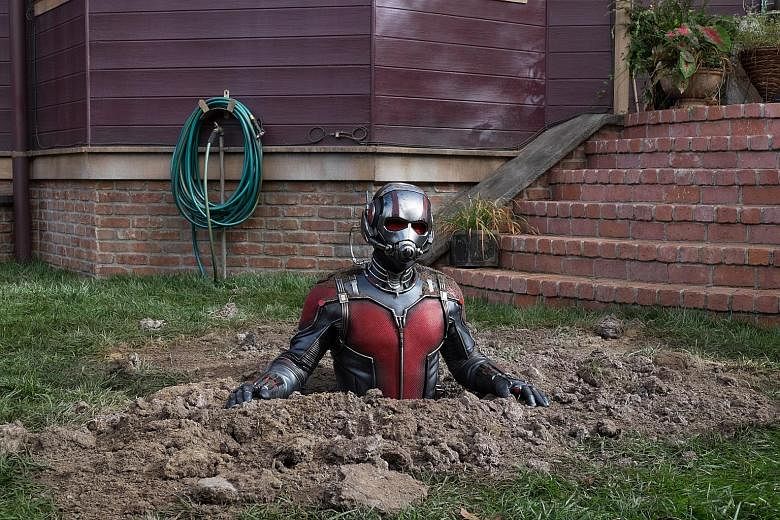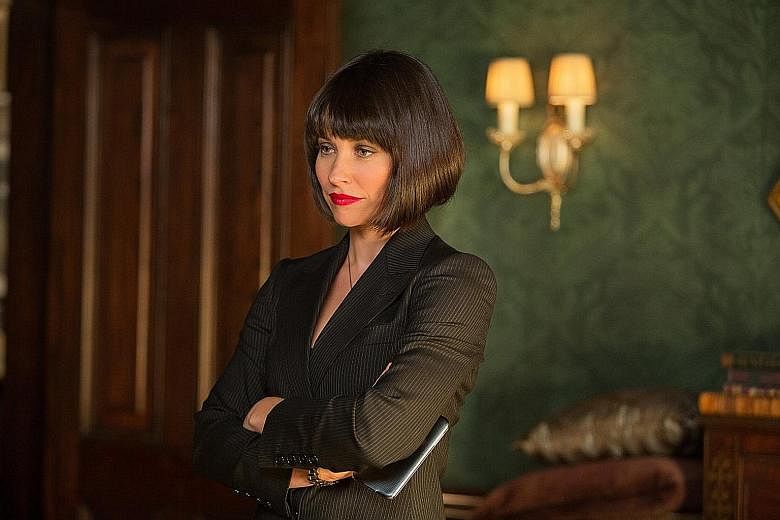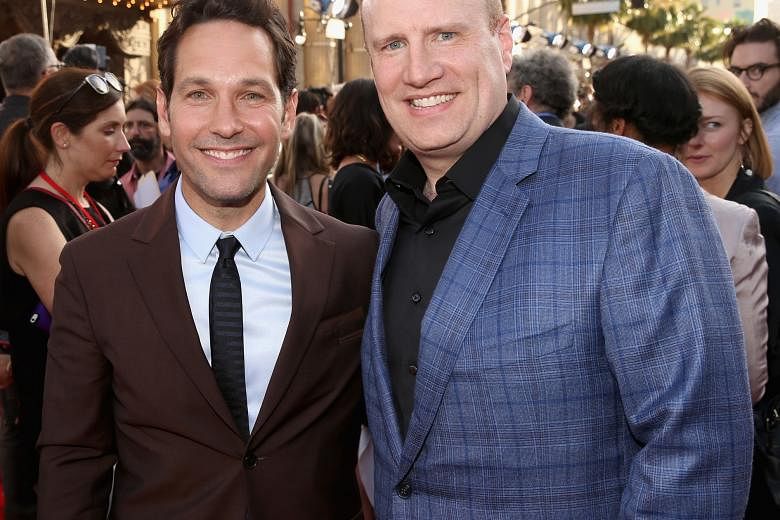As Marvel Studios unveils its newest superhero blockbuster, Ant-Man, one question it is being asked repeatedly is: Why has there not been an "Ant-Woman", or indeed another Marvel movie helmed by a female superhero?
One of the characters in Ant-Man, which opens in Singapore this week, will ask this very question because she feels she is perfectly qualified to be that superhero.
And she has a point, admits Marvel Studios president and Hollywood power player Kevin Feige.
Played by Evangeline Lilly, the character Hope van Dyne is the daughter of Hank Pym (Michael Douglas), the scientist who invents a suit that can shrink a person to ant size. In the film, Pym wants Scott Lang (Paul Rudd) to put on the suit and take over from him as Ant-Man, even though Hope argues that she should be the one to do it.
Mr Feige, 42, says: "The entire movie is essentially her saying, 'I could do this, I could be this hero,' and her father for some reason saying no, even though she's more capable than Lang initially."
The film eventually reveals Pym's reason for stopping her - "and it has nothing to do with him not thinking she's perfectly capable", adds Mr Feige.
But nevertheless, at a press event in Los Angeles, he and the cast of Ant-Man were quizzed about why women have been sidelined in the universe of Marvel comics adapted for the screen.
Mr Feige - named by The Hollywood Reporter as one of the 30 most powerful producers in the industry, with a resume of films that have earned more than
US$8 billion (S$10.9 billion) at box offices worldwide - struggles to provide a satisfactory answer.
What he does say is, things are slowly changing.
In an interview with Life, the 42-year-old points out that the studio announced last October that it is developing a film called Captain Marvel, its first female-led title after 12 comic-book adaptations.
But Captain Marvel will not be released till 2018, and when it does, it will be haunted by the ghosts of the few comic-book heroines who made it to the screen only to fail spectacularly: 2005's Elektra, starring Jennifer Garner, 2004's Catwoman with Halle Berry, and the 1984 Supergirl movie with Helen Slater.
Mr Feige, who was a co-producer on Elektra, cites this disastrous run when asked why so few female superhero films have been made. But he stresses that these movies "did not fail because they were led by female heroes - they failed because they were all bad movies", including Elektra.
The success of more recent female-centric movies proves audiences are receptive to such stories.
"Look at Mad Max," he says, referring to this year's postapocalyptic adventure flick starring Tom Hardy and Charlize Theron. "It's called Max, but Charlize is the hero of that movie and it was a giant hit and she was great.
"Or look at The Hunger Games movies, or Frozen, or Lucy last year with Scarlett Johansson. They are just as viable as any movie."
This is because the traditionally male-dominated comic-book fanbase is evolving, he suggests.
"The female-genre fanbase is either growing, or getting more vocal, or both. When I go to comicbook conventions or premieres and see people dressed up as characters, there are as many if not more women than men now. So women are very much a gigantic portion of the fanbase."
Mr Feige, who is known for his encyclopaedic knowledge of comics, says there is no shortage of women in the source material either.
"There have been strong, powerful, intelligent women in the comics for decades.
"And if you go back to look at our movies - whether it's Natalie Portman in the Thor films, Gwyneth Paltrow in Iron Man or Scarlett Johansson in The Avengers - our films have been full of smart, intelligent, powerful women.
"They haven't been the title characters up till this point and that has changed now that we've announced Captain Marvel, in which the title character will be Carol Danvers," he says, referring to a popular character from the comic books who acquires special powers after her genes fuse with alien ones during an explosion.
He insists this project is unrelated to the calls for more substantial female characters in Marvel's cinematic universe, where film and television projects are typically planned years in advance, with releases now scheduled up to 2028.
While he acknowledges that "there has been a shift in the press and the public in terms of a very vocal clamouring for stand-alone female character films", he says Marvel has always "gone for the powerful woman versus the damsel in distress".
But even powerful women are not exempt from criticism.
Mr Feige is quick to defend Marvel over what some saw as a sexist portrayal of Black Widow, Johansson's character in Avengers: Age Of Ultron, which triggered a lively debate among critics and fans.
Feminists took issue with the fact that the script had Black Widow believing she is a "monster" because she was sterilised and cannot have children and that another character comments about how she has flirted with multiple members of the Avengers team.
Avengers: Age Of Ultron stars Jeremy Renner and Chris Evans were also accused of sexism after calling the Black Widow character a "slut" and a "whore" in an interview, although they said the remarks were in jest.
"In terms of essays written about Black Widow in Ultron, I think they're all valid. Everybody's opinions are valid," Mr Feige says.
But "to suggest that female characters can't have multiple dimensions is also ludicrous".
"That Black Widow went through a programme in which she was forced to have her reproductive organs removed is probably a little upsetting to her. So that people would be upset that she's upset - that's a little strange," he adds.
"And there's no bigger advocate for women than Joss Whedon," he says, referring to Age Of Ultron's director, who has been a vocal proponent of women's rights. "To suggest he's done anything to undermine that is ludicrous."
So Marvel, he repeats, is not reacting to such critiques.
"It would paralyse you if you were trying to develop a story or character that is going to please everyone on the Internet. You would curl up into a ball and never do anything."
The studio boss, who is married to Caitlin Feige, a nurse, also emphasises his own personal stake in developing positive representations of women on screen.
"I don't want to see misrepresented women in our movies. The majority of my bosses and my mentors have been women.
"And on a personal level, my daughter is six years old now. She just lost her two front teeth, just like Scott Lang's daughter Cassie in Ant-Man, and is beginning to learn what Daddy does and about the different types of heroes. She has red hair and is constantly pointing at Black Widow and wanting to learn more about that. So it is incredibly personal and important to me."
During a press conference for Ant-Man, Mr Feige teases the possibility that his daughter might have another Marvel heroine to look up to in the future.
"There's not going to be an Ant-Woman, but there is a Wasp. And if you stay through the credits of the movie, there's a chance you'll see something," he says.
There has been speculation among comic-book fans that the Wasp will be played by Lilly, but the actress herself takes Mr Feige's line in arguing that the most important thing is that women characters are strong and inspiring, regardless of the size of the role.
"There was a lot of buzz on the Internet - is Evangeline a superhero? And I had a lot of questions directed my way about that," says the 35-year-old, who is best known for the TV series Lost.
"And I just couldn't have been happier saying, actually, she is just a really capable, powerful force to be reckoned with, even though she doesn't have a superpower and doesn't put on a fancy suit. My supersuit was the power suit that I would go to work in and be a high-level scientist in, and I do think that's a fantastic example for young women.
"When I pick a role, one of the things that I aspire to is that somebody's parent will come up to me afterwards and say, 'My daughter idolises that character. You're her hero.'
"That's what we aim for - especially in this brand. We're in the business of making heroes."
• Ant-Man opens in Singapore tomorrow.



